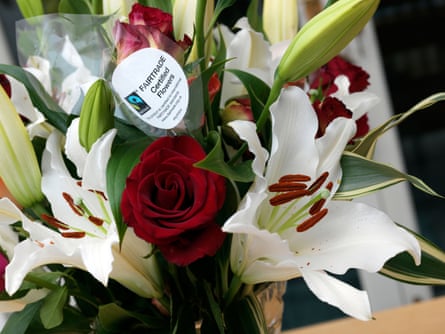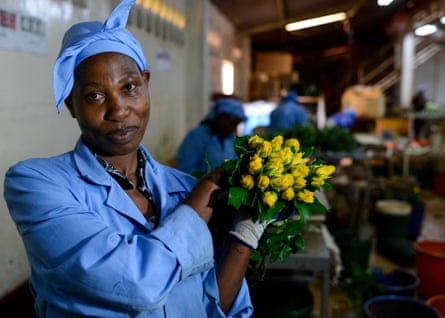
The carbon footprint of imported flowers can be 10 times that of a homegrown bouquet, so it pays to “buy small and buy British”.
That was one of the conclusions of a Lancaster University study in 2018 that looked at the environmental impact of British, Dutch and Kenyan cut flowers.
The research conducted by Becky Swinn looked at the carbon emissions relating to cultivation and transportation, plus other key issues such as fertiliser and water use. She concluded that the emissions from Dutch and Kenyan flowers were broadly equal, with the Dutch flowers using a lot more artificial heating and lighting, while the Kenyan emissions came mainly from transportation. Overall, she found that an imported mixed bouquet produced 10 times greater carbon emissions than a seasonally grown British one.
 View image in fullscreenFairtrade-certified farms receive a premium of 10% for every stem sold. Photograph: Alamy
View image in fullscreenFairtrade-certified farms receive a premium of 10% for every stem sold. Photograph: Alamy
Friends of the Earth says that if you really want cut flowers, try to source some that are locally produced and grown without pesticides if possible. Alternatively, consider planning ahead and growing your own.
Flowers sold in supermarkets and other outlets will often state whether they were grown in the UK.
If you do go for imported flowers – and some will want to support farmers and workers in countries such as Kenya and Ethiopia – you may want to choose Fairtrade ones. Fairtrade-certified farms receive a premium of 10% for every stem sold, which allows workers to invest in healthcare, education and other benefits. The Fairtrade website lists stockists; they include Aldi, Asda, the Co-op, Lidl and Marks & Spencer.
There are other schemes to look out for, too, such as the Florverde Sustainable Flowers certification programme.
Sending flowers can involve a lot of waste, so you may want to look for a certified carbon neutral florist, such as Bloom & Wild, or one that offers a plastic-free range, such as Bunches. “We are working towards having zero plastics in all our deliveries,” says Dani Turner at Bunches. “We haven’t got there yet because that’s a real journey to go on with suppliers but our letterbox range is entirely plastic-free.” Prices start at £24 for 15 pink and cream carnations, surrounded by pink gypsophila, with free delivery.
Bunches says it also donates a minimum of 10% of its profits to charitable projects in the UK and abroad.
The company sources its flowers from all over the world. Although this approach is often criticised as unsustainable, Turner argues that the company is providing employment for growers in developing countries such as Colombia, where she says the flower industry is helping farm workers and their families to have access to healthcare and education.
 View image in fullscreenSimbi Roses is a Fairtrade flower farm in Thika, Kenya, that produces cutting flowers for export. Photograph: Joerg Boethling/Alamy
View image in fullscreenSimbi Roses is a Fairtrade flower farm in Thika, Kenya, that produces cutting flowers for export. Photograph: Joerg Boethling/Alamy
She also claims that from an emissions perspective it can be better to grow a carnation in Colombia and fly it to Britain than grow it here using electricity.
Friends of the Earth says that with cut flowers, the four issues for it are carbon footprint, pesticide use, land and water use, and unsustainable and unrecyclable materials used to display and package them.



